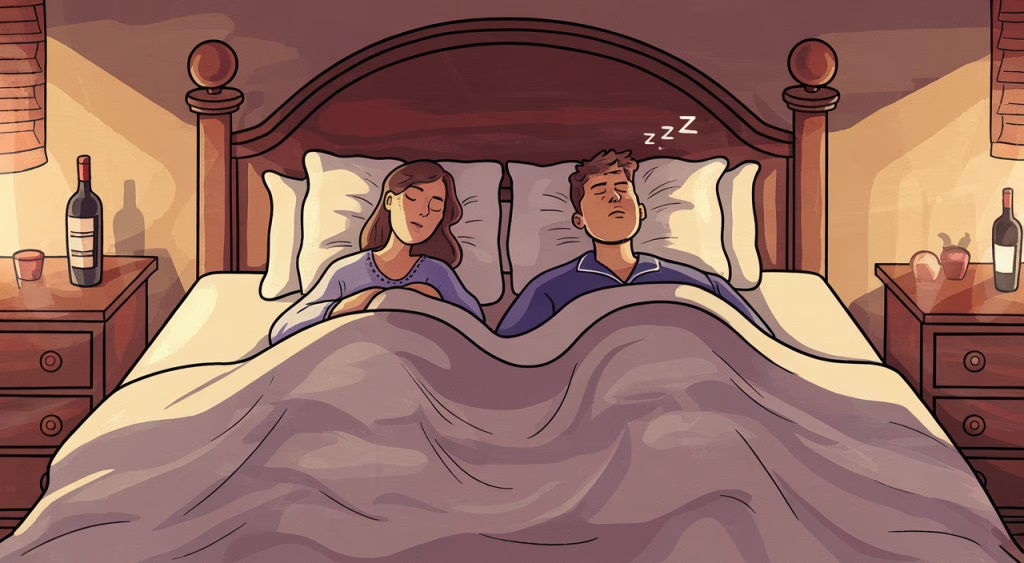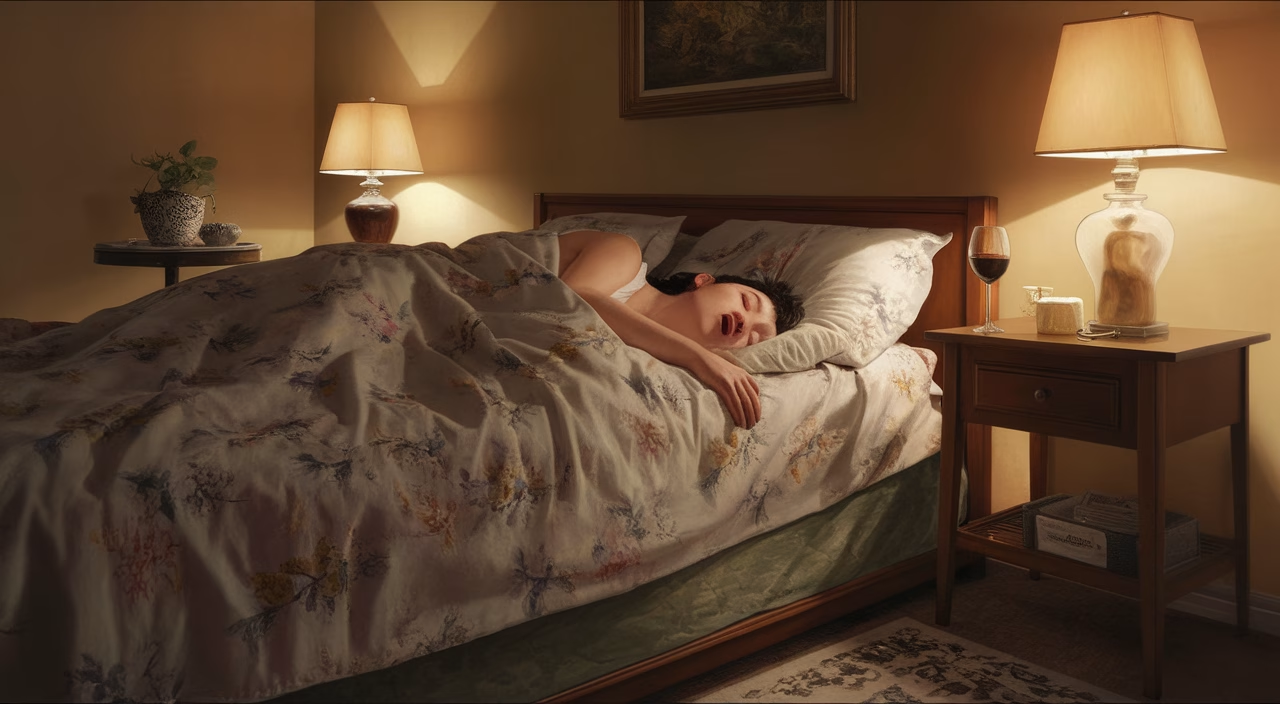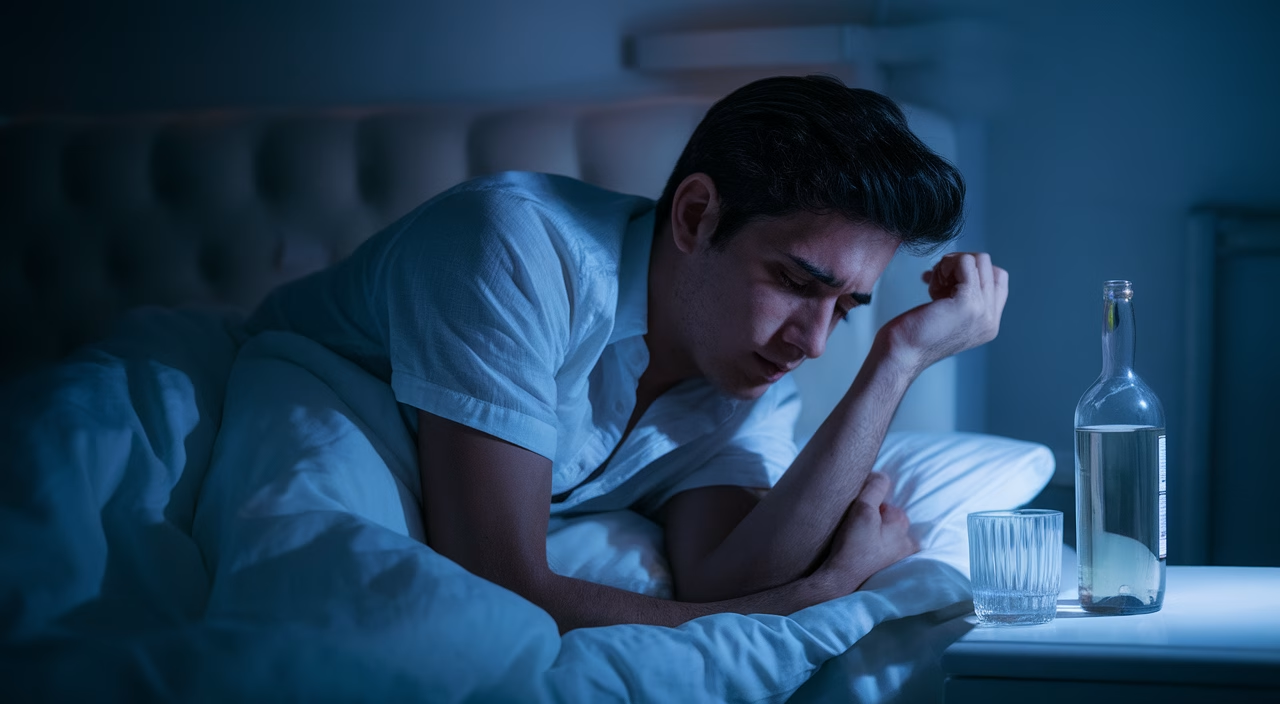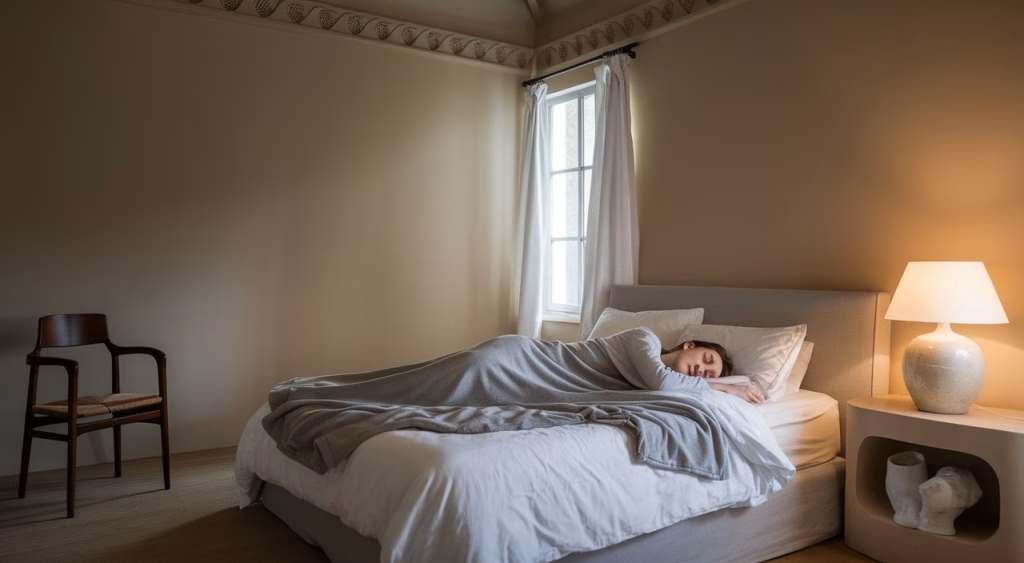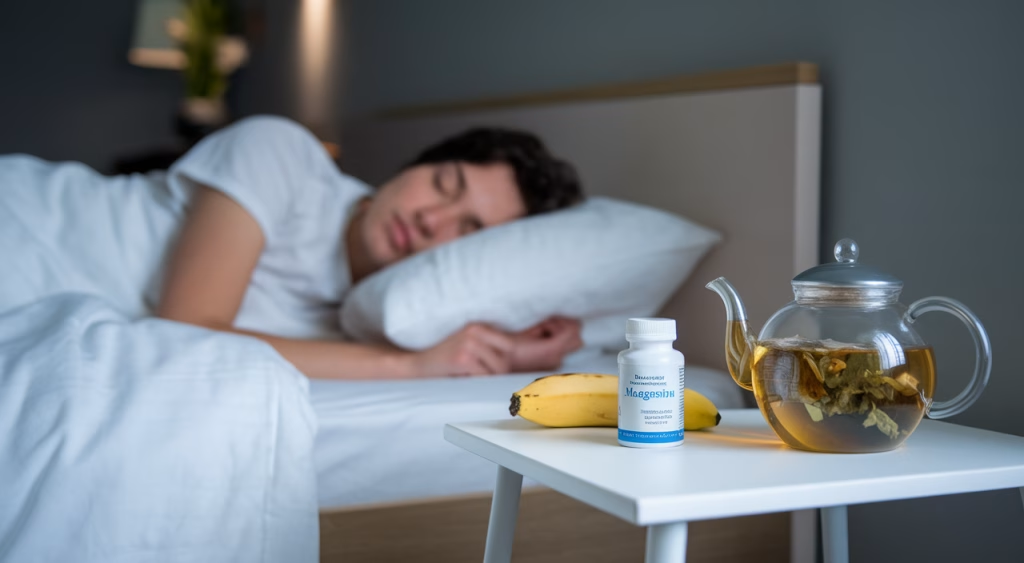Does drinking alcohol make snoring worse?
Yes — **alcohol and snoring** are scientifically linked. Alcohol acts as a muscle relaxant that specifically targets your throat muscles, narrowing your airway and dramatically increasing your chances of snoring or triggering sleep apnea episodes. If you’re wondering about **alcohol effects on snoring**, the connection is immediate and measurable.
TL;DR Summary
- Alcohol and snoring are linked: Alcohol relaxes throat muscles, making airway obstruction more likely.
- Drinking affects sleep quality: While it may help you nod off, it fragments REM sleep and worsens breathing disruptions.
- Worsened sleep apnea symptoms: The **alcohol sleep apnea correlation** shows drinking exacerbates obstructive sleep apnea, especially when consumed close to bedtime.
- Real signs to watch for: Louder and more frequent snoring, gasping during sleep, morning headaches, and fatigue can be red flags when drinking is involved.
- Solutions exist: Simple lifestyle **remedies for snoring**, sleep routine tweaks, and smart alcohol timing can make a world of difference.
Understanding Snoring and Sleep Apnea
Snoring may sound harmless, even amusing at times. But when **alcohol and snoring** combine, it becomes far from a nighttime nuisance — it’s your body’s way of saying, “I’m not getting the oxygen I need.” Snoring occurs when air can’t move freely through your nose and throat during sleep. That restricted airflow causes the surrounding tissues to vibrate — and that’s the sound you (or your partner) hears.
Sleep apnea takes things further. It’s a potentially serious condition where breathing repeatedly stops and starts during sleep. The most common type is obstructive sleep apnea (OSA), which occurs due to the relaxation and collapse of throat muscles. These pauses can last seconds to minutes and disrupt your entire sleep cycle.
Understanding **alcohol effects on snoring** is crucial because alcohol intensifies these airway collapses, making both conditions significantly worse.
How Alcohol Affects Sleep Quality
When you explore **alcohol effects on sleep quality**, the picture becomes clear. While alcohol makes you drowsy, luring you into sleep quicker thanks to its sedative effects, it also robs your sleep of depth and structure. This is where the **alcohol and snoring correlation** becomes particularly problematic.
Here’s what typically happens: You fall asleep fast, then spend the night oscillating between light sleep and short awakenings. Alcohol reduces the time spent in REM (rapid eye movement) sleep — the stage linked to emotional processing and memory consolidation. Even more importantly for snorers, it causes your upper airway muscles to relax excessively. This means there’s a greater chance that your airway will collapse or narrow, especially if you sleep on your back.
Think of it like a tunnel with a soft ceiling. When sober, airflow moves through steadily. After drinking, the ceiling sags and collapses, narrowing the space and causing rattling sounds — or even complete blockages. This is why implementing **tips for better sleep** often starts with examining your drinking habits.
Research Findings on Alcohol and Snoring
Scientific research confirms what many of us have observed firsthand about the **alcohol and snoring correlation**. A comprehensive study published in the American Journal of Respiratory and Critical Care Medicine found that alcohol significantly increases both snoring frequency and severity — especially in men. Another key finding revealed the **alcohol sleep apnea correlation**: alcohol made existing obstructive sleep apnea worse by lengthening apneas and decreasing nighttime oxygen levels.
Let’s break down the **alcohol effects on snoring**:
| Key Finding | Effect on Sleep |
|---|---|
| Throat Muscle Relaxation | Narrowed airway increases snoring intensity |
| Suppressed Arousal Response | Reduces body’s ability to wake up from oxygen drops |
| Disrupted REM Sleep | Leads to poor cognitive recovery and mood instability |
| Worsened Apnea Episodes | Longer, more frequent apneas during alcohol nights |
In practice, you’ll notice heavier, more uneven breathing, longer snoring spells, and a foggier morning after nights with alcohol intake — especially if drinking occurs within 2-3 hours before bed. These findings make understanding **alcohol effects on sleep quality** essential for anyone dealing with sleep disorders.
Tips for Managing Snoring and Sleep Apnea
Let’s be honest: for many adults, enjoying a drink is part of unwinding or social life. Completely swearing off alcohol may feel unrealistic. Thankfully, managing the **alcohol and snoring** connection doesn’t require all-or-nothing thinking. Here are proven **tips for better sleep** and effective **remedies for snoring** when alcohol is involved:
1. Master Your Timing
Stop drinking alcohol 3-4 hours before bed. This allows your body to metabolize most of the alcohol before sleep, significantly reducing **alcohol effects on snoring** and improving overall sleep quality.
2. Stay Hydrated
Alcohol is dehydrating, which thickens mucus in the throat and makes snoring worse. Alternate alcoholic drinks with water to offset this effect — it’s one of the simplest **remedies for snoring**.
3. Side-Sleeping Is Key
Shift to your side instead of your back. Gravity intensifies throat collapse when you lie flat, worsening the **alcohol sleep apnea correlation**. Body pillows can help you maintain position throughout the night.
4. Track Your Patterns
Use a sleep app or snore monitor to notice trends in your **alcohol and snoring** patterns. Do you snore louder after 2 glasses of wine? Knowledge is power when creating habits that serve your sleep.
5. Consider Temporary Abstinence
If you’re investigating **remedies for snoring**, try 1–2 weeks alcohol-free and compare notes. Many people discover dramatically quieter nights and better **alcohol effects on sleep quality** when they eliminate evening drinking.
Cost Guide: Snoring and Sleep Management Solutions
| Solution | Low-End Cost | Mid-Range | High-End |
|---|---|---|---|
| Nasal Strips | $5–$10 | $15–$25 | $30+ |
| Body Pillow | $20 | $40–$60 | $100+ |
| Sleep Study | $100 (home test) | $250–$400 | $1000+ (in-lab) |
| CPAP Machine | $400 | $600–$900 | $1200+ |
Consider these tools if **alcohol and snoring** issues persist. Combine them with changes in alcohol habits for best results, and you’ll find multiple **remedies for snoring** that work together effectively.
Conclusion: Improving Sleep Habits
Getting high-quality sleep isn’t just about how long you spend in bed — it’s about what happens after your head hits the pillow. When the **alcohol and snoring correlation** sends airflow into chaos and muscles into slack mode, snoring and sleep disorders like apnea can turn harmless habits into health concerns. But knowledge is the game-changer here.
Keep this in mind: occasional light drinking has less impact than nightly habits or binge sessions. If you’re navigating **alcohol sleep apnea correlation** concerns, moderate your intake, stay consistent with your routine, and ask for help when things feel out of balance. The **tips for better sleep** we’ve shared are proven to work, and there’s power in awareness combined with small adjustments.
Your sleep isn’t just downtime — it’s your daily foundation. Understanding **alcohol effects on sleep quality** and implementing targeted **remedies for snoring** can transform your nights. Treat your sleep with care, and your groggy mornings and groaning bed partners might just become a distant memory.
Frequently Asked Questions
Does drinking alcohol cause excessive snoring?
Yes. The **alcohol and snoring** connection is clear: drinking alcohol relaxes throat muscles, makes airways more likely to collapse, and often leads to louder or more frequent snoring episodes.
How long before bed should I stop drinking to avoid snoring?
Stop alcohol intake at least 3-4 hours before bedtime. This gives your body time to metabolize alcohol and reduce **alcohol effects on snoring** and sleep stages.
Can quitting alcohol stop my snoring completely?
Reducing or stopping alcohol may significantly improve snoring, especially if it’s a known trigger. However, if anatomical or lifestyle factors also contribute, you may need multiple **remedies for snoring**.
Is it okay to drink occasionally if I have sleep apnea?
Occasional, moderate drinking might be manageable for some, but consult your doctor about the **alcohol sleep apnea correlation**. Alcohol can exacerbate apnea, so monitoring symptoms is crucial.
Why do I snore only when I drink alcohol?
That’s due to **alcohol effects on snoring** — specifically alcohol relaxing your throat muscles. If you snore only after drinking, alcohol is clearly the trigger factor.
Does alcohol reduce oxygen levels during sleep?
Yes. Alcohol can suppress breathing responses, increasing the duration and severity of low-oxygen episodes, especially in individuals with sleep apnea. This is a key part of the **alcohol sleep apnea correlation**.
Absolutely. Disrupted sleep from **alcohol and snoring** or breathing pauses increases next-day fatigue, cloudy thinking, and even mood changes — all signs that **alcohol effects on sleep quality** are impacting your daily life.

